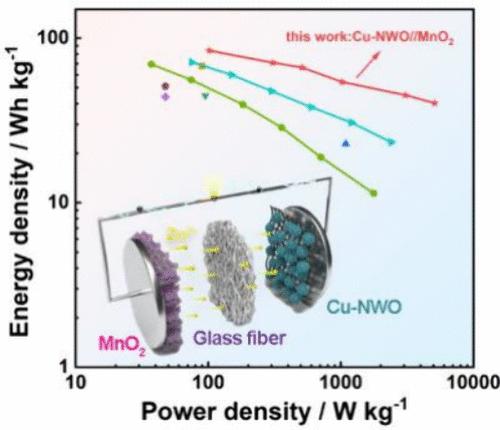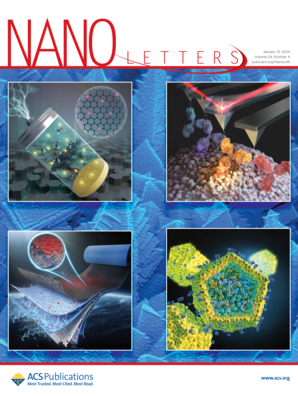Electronic Regulation Engineering of (NH4)0.25WO3 Anode Enables Fast and Stable Rocking-Chair Zinc-Ion Batteries
IF 9.6
1区 材料科学
Q1 CHEMISTRY, MULTIDISCIPLINARY
引用次数: 0
Abstract
Rechargeable aqueous zinc-ion batteries (ZIBs) have emerged as promising candidates for energy storage due to their low cost, high safety, and high theoretical energy density. However, the utilization of Zn anodes results in unsatisfied rate performance and cycling stability due to the Zn dendrites, unsatisfactory stripping/plating efficiency, and gas evolution. Herein, we propose a novel approach to construct “rocking-chair” ZIBs with h-WO3 as non-Zn anode to address these issues. Metallic and nonmetallic ion-doped h-WO3 (Cu-NWO) are designed and deliver high capacity as an intercalation anode of “rocking-chair” ZIBs due to their unique delocalized electronic structure and high active sites. Density functional theory calculations certify that the Cu2+ preintercalation can strengthen the electrochemical kinetics and simultaneously reduce diffusion barriers on Zn2+ storage. The aqueous “rocking-chair” ZIBs deliver a long cycle life and high energy density and successfully realize a self-powered electrochromic device, making them more suitable for practical applications in a smart gird.

求助全文
约1分钟内获得全文
求助全文
来源期刊

Nano Letters
工程技术-材料科学:综合
CiteScore
16.80
自引率
2.80%
发文量
1182
审稿时长
1.4 months
期刊介绍:
Nano Letters serves as a dynamic platform for promptly disseminating original results in fundamental, applied, and emerging research across all facets of nanoscience and nanotechnology. A pivotal criterion for inclusion within Nano Letters is the convergence of at least two different areas or disciplines, ensuring a rich interdisciplinary scope. The journal is dedicated to fostering exploration in diverse areas, including:
- Experimental and theoretical findings on physical, chemical, and biological phenomena at the nanoscale
- Synthesis, characterization, and processing of organic, inorganic, polymer, and hybrid nanomaterials through physical, chemical, and biological methodologies
- Modeling and simulation of synthetic, assembly, and interaction processes
- Realization of integrated nanostructures and nano-engineered devices exhibiting advanced performance
- Applications of nanoscale materials in living and environmental systems
Nano Letters is committed to advancing and showcasing groundbreaking research that intersects various domains, fostering innovation and collaboration in the ever-evolving field of nanoscience and nanotechnology.
 求助内容:
求助内容: 应助结果提醒方式:
应助结果提醒方式:


